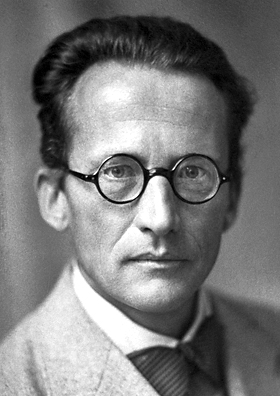Erwin Schrödinger
 Erwin Rudolf Josef Alexander Schrödinger (, ; ; 12 August 1887 – 4 January 1961), sometimes written as or , was a Nobel Prize–winning Austrian and naturalized Irish physicist who developed fundamental results in quantum theory. In particular, he is recognized for postulating the Schrödinger equation, an equation that provides a way to calculate the wave function of a system and how it changes dynamically in time. He coined the term "quantum entanglement", and was the earliest to discuss it, doing so in 1932.
Erwin Rudolf Josef Alexander Schrödinger (, ; ; 12 August 1887 – 4 January 1961), sometimes written as or , was a Nobel Prize–winning Austrian and naturalized Irish physicist who developed fundamental results in quantum theory. In particular, he is recognized for postulating the Schrödinger equation, an equation that provides a way to calculate the wave function of a system and how it changes dynamically in time. He coined the term "quantum entanglement", and was the earliest to discuss it, doing so in 1932.In addition, he wrote many works on various aspects of physics: statistical mechanics and thermodynamics, physics of dielectrics, colour theory, electrodynamics, general relativity, and cosmology, and he made several attempts to construct a unified field theory. In his book ''What Is Life?'' Schrödinger addressed the problems of genetics, looking at the phenomenon of life from the point of view of physics. He also paid great attention to the philosophical aspects of science, ancient, and oriental philosophical concepts, ethics, and religion. He also wrote on philosophy and theoretical biology. In popular culture, he is best known for his "Schrödinger's cat" thought experiment.
Spending most of his life as an academic with positions at various universities, Schrödinger, along with Paul Dirac, won the Nobel Prize in Physics in 1933 for his work on quantum mechanics, the same year he left Germany due to his opposition to Nazism. In his personal life, he lived with both his wife and his mistress which may have led to problems causing him to leave his position at Oxford. Subsequently, until 1938, he had a position in Graz, Austria, until the Nazi takeover when he fled, finally finding a long-term arrangement in Dublin, Ireland, where he remained until retirement in 1955, and where he pursued several sexual relationships with minors. Provided by Wikipedia


